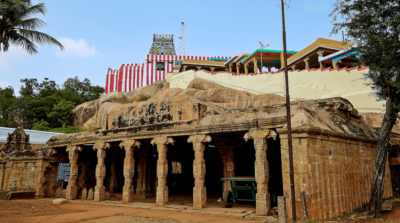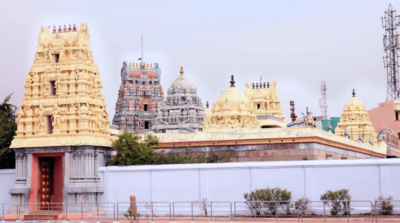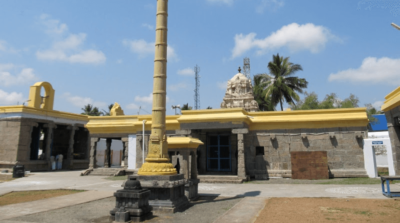Arupadai Veedu Murugan Temple
The Arupadai Veedu Murugan Temple in Chennai (Madras) is a popular temple dedicated to Lord Murugan, the warrior god who is deeply revered in Tamil Nadu. The temple is named after the six abodes (Arupadai Veedu) of Lord Murugan, which are key pilgrimage sites spread across Tamil Nadu. This temple is unique because it brings together all six of these sacred shrines into one location, allowing devotees in Chennai to worship Lord Murugan in his six iconic forms.
History and Significance
The Arupadai Veedu Murugan Temple was built in 2002 and is located in Besant Nagar, Chennai. It was constructed with the purpose of providing devotees in Chennai with a spiritual center dedicated to Murugan, allowing them to experience the energy and significance of his six abodes (Arupadai Veedu) without having to travel to different parts of Tamil Nadu.
The temple follows the Dravidian architectural style, with ornate gopurams (temple towers) and sculptures depicting Lord Murugan and other deities. The temple has gained immense popularity due to its spiritual importance and the ability to perform prayers to all six forms of Lord Murugan in one location.
The Six Abodes (Arupadai Veedu)
The term Arupadai Veedu refers to the six sacred temples of Lord Murugan, where he is believed to have performed various heroic deeds. These are located at different sites across Tamil Nadu, and each has a unique significance tied to the legends of Murugan. The six abodes represented in the Chennai temple are:
- Tirupparamkunram:
- Here, Lord Murugan married Deivanai, the daughter of Indra, the king of the gods.
- This shrine represents Murugan as the god of victory.
- Tiruchendur:
- Located on the shores of the Bay of Bengal, this is the place where Lord Murugan defeated the demon Surapadman in the famous battle of Skanda Sashti.
- Palani:
- At Palani, Lord Murugan is worshipped as a renunciate in the form of Dhandayuthapani (one holding a staff). The temple represents his detachment from worldly pleasures.
- Swamimalai:
- This is where Lord Murugan is believed to have taught his father, Lord Shiva, the meaning of the sacred Om. It signifies Murugan as a teacher of wisdom.
- Thiruthani:
- At this temple, Murugan is believed to have married Valli, his second consort, symbolizing his divine love and compassion.
- Pazhamudircholai:
- This temple is located amidst lush greenery and forests. It represents Murugan as a youthful god who blesses his devotees with intelligence and protection.
Deity Forms at the Chennai Temple
At the Arupadai Veedu Murugan Temple in Chennai, each of the six forms of Lord Murugan associated with these abodes is enshrined in its own separate sanctum. Devotees can visit each sanctum and offer prayers according to their desires, seeking different blessings such as victory, wisdom, peace, and protection.
In addition to Lord Murugan, there are shrines for other deities as well, including Lord Vinayagar (Ganesha), Goddess Durga, and Lord Shiva, making it a comprehensive place of worship.
Festivals and Celebrations
The Arupadai Veedu Murugan Temple observes major festivals associated with Lord Murugan. Some of the most significant celebrations include:
- Skanda Sashti:
- This is the most important festival celebrated in honor of Murugan’s victory over the demon Surapadman. The festival involves elaborate rituals, special poojas, and the re-enactment of the battle between Murugan and the demon.
- Thaipusam:
- Celebrated in the Tamil month of Thai (January/February), Thaipusam is a day of devotion and penance. Devotees carry Kavadi (burdens) to express their devotion and seek Murugan’s blessings.
- Panguni Uthiram:
- This festival celebrates the divine marriages of Murugan with his consorts Deivanai and Valli, symbolizing divine love and union.
- Karthigai Deepam:
- This is a festival of lights celebrated in honor of Lord Murugan. Lamps are lit, and special prayers are offered to bring light into the lives of devotees.
Daily Rituals and Poojas
The temple follows a strict daily schedule of poojas (prayers) and rituals, similar to other Murugan temples. The main daily worship includes:
- Ushakala Pooja (early morning)
- Kalasandhi Pooja (mid-morning)
- Uchikala Pooja (noon)
- Sayaraksha Pooja (evening)
- Ardha Jamam Pooja (night)
Devotees can participate in special Archanais (prayer offerings), Abhishekams (ritual bathings of the deity), and other offerings throughout the day.
Significance to Devotees
The Arupadai Veedu Murugan Temple in Chennai holds great significance for devotees as it allows them to experience the blessings and energy of all six sacred abodes of Lord Murugan in one location. Many believe that offering prayers to all six forms of Murugan can help overcome obstacles, achieve success, gain wisdom, and experience peace.
The temple is a spiritual haven for Murugan devotees, who can perform prayers and participate in rituals without having to travel across Tamil Nadu. Its location in the heart of Chennai makes it easily accessible to city dwellers and visitors alike.
The Arupadai Veedu Murugan Temple in Chennai is a unique temple that encapsulates the essence of Lord Murugan’s six abodes. It is a center for spiritual worship, meditation, and devotion, drawing thousands of devotees daily. The temple’s festivals, daily poojas, and serene atmosphere make it an important place of worship for those seeking Murugan’s divine blessings.




